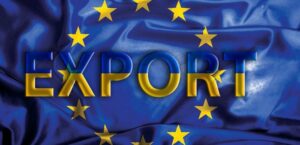
The European Commission (EC) has proposed to suspend for one year the collection of import duties on all Ukrainian exports to the European Union, the EC communiqué said on Wednesday.
“I discussed with President Zelensky ways to support the economy, in addition to the macro-financial assistance and grants that we provide. We both agree on the critical importance of a quick and wide suspension of import duties to boost the economy of Ukraine,” European Commission President Ursula von der Leyen was quoted in the message.
According to her, the suspension of duties “will greatly facilitate the export of Ukrainian industrial and agricultural goods to the EU.” She promised continued economic assistance to Kyiv.
The EC proposal also provides for the suspension for one year of all EU anti-dumping and safeguard measures in force against Ukrainian steel exports. This move, explained in Brussels, is designed to help increase Ukraine’s exports to the EU, which will alleviate the plight of Ukrainian producers and exporters in the current situation in the country.
“The EU has never before taken such trade liberalization measures, which are unprecedented in their scope: giving Ukraine access to the EU market with zero tariffs, zero quotas,” said Valdis Dombrovskis, Executive Vice President of the European Commission.
The European Commission points out that in the difficult conditions of the situation in Ukraine, the European Union wants to do everything possible to help the country “maintain its trade positions with the rest of the world and further deepen its trade relations with the EU.”
Brussels also reports that the EU is taking measures to facilitate land transport of goods to help export Ukrainian products outside the country. Thus, the European Commission has already begun liberalizing the conditions for Ukrainian truck drivers transporting goods between Ukraine and the EU, as well as actions to facilitate transit and use the EU infrastructure to direct Ukrainian exports to third countries.

The National Bank of Ukraine (NBU) estimates a potential reduction in revenue from the sale of export products subject to the EU I Carbon Border Adjustment Mechanism (CBAM) at the level of $100 million annually from 2026.
The estimates were given in the quarterly inflation report of the NBU.
The NBU said that Ukrainian exporters of carbon-intensive metallurgical products to the EU ($30-50 million per year) will suffer the lion’s share of the damage.
At the same time, the cumulative damage for exporters subject to CBAM is assessed as moderate.
The action of CBAM in the wording proposed by the European Commission will apply to the import of fertilizers, electricity, products of the cement industry and metallurgy (iron, steel, aluminum). These are, as noted in the EC, the sectors with the highest carbon dioxide emissions.
At the same time, the National Bank said that the income of Ukrainian companies may be reduced even more if the mechanism is extended to other sectors of the economy, indirect CO2 emissions are added, free emission quotas in the EU are rapidly eliminated and the transition period is reduced.
Such initiatives, as is known, are put forward by a number of members of the European Parliament. The law on the introduction of the mechanism can be adopted already in the middle of this year after parliamentary consultations.
To minimize the negative impact of CBAM, the NBU advises to focus on the development of a national emissions trading system (ETS), which, in turn, will allow the collected funds to be directed to eco-modernization.
The conclusions of the National Bank differ significantly from the estimates of the Kyiv School of Economics (KSE). KSE experts predict that the introduction of CBAM by the European Union could lead to an annual reduction in the income of Ukrainian companies up to EUR 396 million annually during 2026-2030. Thus, Ukraine’s GDP will decrease by 0.08% per year.